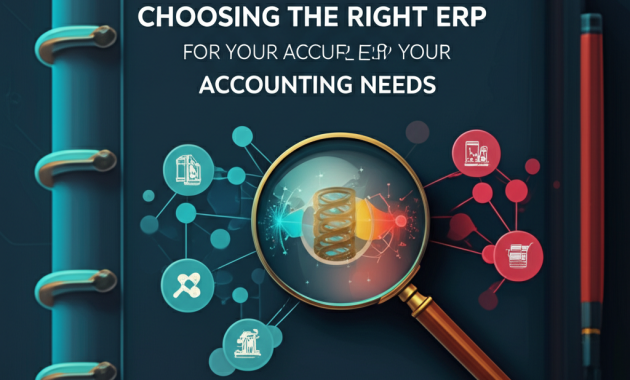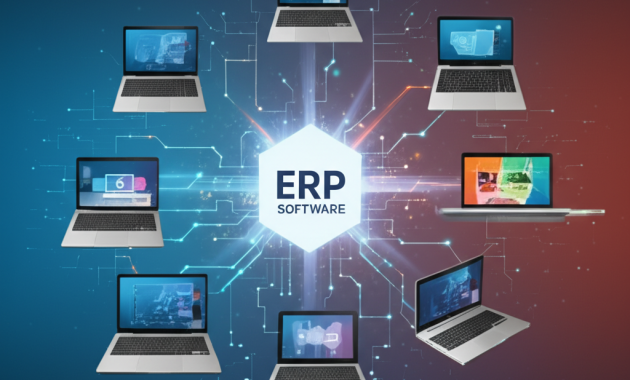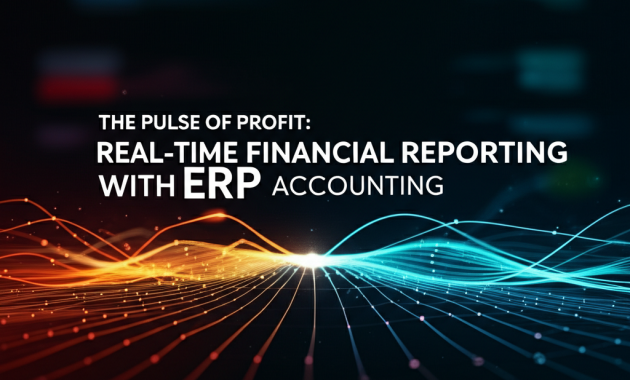The journey of a startup is often depicted as a thrilling rollercoaster – exhilarating highs, sharp turns, and sometimes, stomach-dropping plunges. Amidst the chaos of innovation, product development, and market penetration, one critical aspect often gets overlooked or relegated to a reactive function: financial management. For a startup, inefficient accounting isn’t just a minor inconvenience; it’s a potential anchor, dragging down growth, stifling decision-making, and even threatening solvency.
Traditionally, managing finances meant grappling with disparate spreadsheets, manual data entry, and fragmented systems that failed to communicate. This approach, while perhaps viable for a tiny operation, quickly becomes unsustainable as a startup scales. Enter the game-changer: cloud-based ERP accounting solutions.
This article will delve into why cloud-based ERP accounting is not just a luxury but a strategic imperative for modern startups, exploring its benefits, essential features, selection considerations, and how it can serve as the financial backbone for sustainable growth.
Demystifying the Jargon: ERP, Accounting, and the Cloud
Before we dive into the "why," let’s clarify the core concepts:
- ERP (Enterprise Resource Planning): At its heart, ERP is a system designed to integrate and manage all core business processes, from financials and human resources to manufacturing and supply chain management, within a single, unified platform. For startups, the "accounting" module is often the entry point, but the power of ERP lies in its potential to connect finance with other operational areas as the company matures.
- Accounting Solution: This specifically refers to the financial modules within an ERP system. It handles the general ledger, accounts payable, accounts receivable, payroll, fixed assets, budgeting, financial reporting, and more. It’s the engine that tracks every dollar in and out of your business.
- Cloud-Based (SaaS – Software as a Service): This means the software is hosted on the vendor’s servers and accessed over the internet, typically via a web browser. Instead of purchasing and installing software on your own computers, you subscribe to it, much like Netflix or Spotify. The vendor manages all the infrastructure, maintenance, and updates.
When we talk about cloud-based ERP accounting for startups, we’re referring to a comprehensive financial management system delivered as a service over the internet, designed to provide a centralized, real-time view of a startup’s financial health, while also laying the groundwork for broader operational integration.
Why Cloud-Based ERP Accounting is a Startup’s Best Friend
The advantages of adopting a cloud-based ERP accounting solution early in a startup’s life cycle are manifold and directly address the unique challenges faced by new businesses:
Cost-Effectiveness & Predictable Spending:
- No Upfront Capital Expenditure (CapEx): Unlike traditional on-premise software that requires significant investment in servers, hardware, and licensing fees, cloud solutions operate on a subscription model. This shifts IT costs from CapEx to OpEx, preserving precious startup capital for core business activities.
- Reduced IT Overhead: Startups rarely have dedicated IT departments. Cloud vendors handle all server maintenance, software updates, security patches, and backups, eliminating the need for in-house IT expertise and resources. This translates to substantial savings in personnel and infrastructure costs.
- Scalable Pricing: Most cloud solutions offer tiered pricing based on user count, features, or transaction volume. You only pay for what you use, allowing costs to align with your growth trajectory.
Unparalleled Scalability & Flexibility:
- Grow with Your Business: As your startup expands, so too can your ERP system. Cloud solutions are inherently scalable, allowing you to easily add more users, integrate new modules (e.g., CRM, inventory, project management), or handle increased transaction volumes without a major system overhaul.
- Adapt to Changing Needs: Startups pivot. Cloud ERPs are designed to be flexible, often offering customization options and integrations with other best-of-breed tools, ensuring your financial system can evolve alongside your business model.
Anywhere, Anytime Accessibility & Collaboration:
- Remote Work Ready: In today’s distributed workforce environment, cloud access is non-negotiable. Team members, accountants, and even investors can securely access financial data from any device, anywhere with an internet connection.
- Real-Time Collaboration: Multiple users can work within the system simultaneously, ensuring everyone is working with the most up-to-date information. This fosters better collaboration between finance, sales, operations, and management.
Enhanced Data Security & Disaster Recovery:
- Expert-Level Security: Reputable cloud ERP vendors invest heavily in state-of-the-art security measures, including data encryption, multi-factor authentication, regular security audits, and redundant data centers. For a small startup, replicating this level of security in-house is virtually impossible.
- Automated Backups & Disaster Recovery: Cloud providers perform regular, automated backups, protecting your critical financial data from hardware failures, cyberattacks, or natural disasters. This built-in redundancy provides peace of mind that your financial records are safe.
Real-Time Insights & Smarter Decision-Making:
- Centralized Data: By integrating various financial functions, cloud ERPs provide a single source of truth for all financial data. This eliminates data silos and discrepancies.
- Dynamic Dashboards & Reporting: Modern cloud solutions offer intuitive dashboards and robust reporting tools, presenting real-time financial performance at a glance. Startups can quickly generate profit & loss statements, cash flow projections, balance sheets, and custom reports, empowering agile decision-making based on current data, not outdated spreadsheets.
- Improved Forecasting: With historical data readily available and advanced analytics features, startups can build more accurate financial forecasts, crucial for fundraising, resource allocation, and strategic planning.
Streamlined Operations & Automation:
- Automated Workflows: Many routine accounting tasks, such as invoice matching, expense approvals, bank reconciliations, and recurring billing, can be automated, significantly reducing manual effort and human error.
- Reduced Manual Entry: Integration with other systems (e.g., CRM for sales data, e-commerce platforms for order data) minimizes the need for manual data input, saving time and improving data accuracy.
- Faster Month-End Close: By automating and streamlining processes, cloud ERPs can drastically cut down the time it takes to close books at month-end, freeing up finance teams for more strategic activities.
Faster Implementation & Automatic Updates:
- Quick Deployment: Cloud ERPs can be implemented much faster than on-premise systems, often within weeks or a few months, allowing startups to realize value sooner.
- Always Up-to-Date: Software updates, new features, and compliance changes are automatically pushed by the vendor, ensuring your system is always running on the latest version without any effort from your side.
Key Features to Look For in a Cloud-Based ERP Accounting Solution
When evaluating options, startups should prioritize solutions that offer a strong foundation of core accounting features, alongside the flexibility to integrate with other essential tools:
Core Accounting Modules:
- General Ledger (GL): The backbone for all financial transactions.
- Accounts Payable (AP): Managing vendor invoices and payments efficiently.
- Accounts Receivable (AR): Tracking customer invoices and managing collections.
- Bank Reconciliation: Automating the matching of bank statements with ledger entries.
- Fixed Assets Management: Tracking and depreciating company assets.
- Expense Management: Streamlining employee expense reporting and reimbursement.
Financial Reporting & Analytics:
- Customizable dashboards and reports (P&L, Balance Sheet, Cash Flow).
- Budgeting and forecasting tools.
- Drill-down capabilities for detailed transaction analysis.
Integration Capabilities (APIs):
- Seamless integration with your CRM (Salesforce, HubSpot), e-commerce platforms (Shopify, WooCommerce), payroll providers (Gusto, ADP), payment gateways (Stripe, PayPal), and other essential business tools. This is crucial for a unified data flow.
Multi-Currency and Multi-Company Support:
- Essential for startups with international aspirations or those planning to launch multiple entities.
Inventory Management (if applicable):
- Tracking stock levels, managing purchase orders, and optimizing inventory turns.
Project Accounting (if applicable):
- For service-based startups, tracking costs and revenue against specific projects.
User-Friendly Interface & Mobile Accessibility:
- Intuitive design reduces the learning curve and boosts productivity. Mobile apps allow for on-the-go approvals and data access.
Robust Security & Compliance:
- Look for certifications (SOC 2, ISO 27001), data encryption, and audit trails to ensure compliance with financial regulations.
Audit Trail & Internal Controls:
- Ensuring every transaction is traceable and that internal controls are in place to prevent fraud and errors.
Navigating the Selection Process: Choosing Your Cloud Compass
Selecting the right cloud-based ERP accounting solution is a critical decision for any startup. Here’s a structured approach:
Assess Your Current & Future Needs:
- Current Pain Points: What are your biggest financial management headaches right now?
- Growth Projections: How many employees, customers, and transactions do you anticipate in 1, 3, and 5 years?
- Industry Specifics: Does your industry have unique accounting requirements (e.g., SaaS revenue recognition, project-based billing)?
- Integration Ecosystem: List all other software you currently use or plan to use (CRM, HRIS, e-commerce, etc.) and ensure the ERP integrates seamlessly.
Define Your Budget:
- Beyond the monthly subscription, consider potential costs for implementation support, training, and custom integrations.
Research & Shortlist Vendors:
- Look at popular options like NetSuite, QuickBooks Online Advanced, Xero, Sage Intacct, Acumatica, and others tailored for SMBs/startups. Read reviews, case studies, and industry reports.
Prioritize Scalability & Flexibility:
- Ensure the solution can grow with you without requiring a complete system overhaul. Can you easily add modules or users?
Evaluate Integration Capabilities:
- Does the vendor offer native integrations with your key systems, or do they have robust APIs for custom connections?
Vendor Reputation & Support:
- Investigate the vendor’s track record, customer support quality, and long-term vision. A good support team is invaluable during implementation and ongoing use.
Request Demos & Trial Periods:
- Don’t just watch videos. Get hands-on with the software. Involve key stakeholders (finance, operations, leadership) in the evaluation.
Consider Implementation & Data Migration:
- Understand the implementation timeline and resources required. How will your historical data be migrated?
Implementation & Beyond: Making it Work
Once you’ve chosen your cloud ERP, successful implementation is key:
- Phased Approach: For complex implementations, consider a phased rollout, starting with core accounting modules and then adding more sophisticated features as your team becomes comfortable.
- Data Accuracy is Paramount: Clean and accurate data migration from your old systems is crucial. "Garbage in, garbage out" applies directly to financial systems.
- User Training: Invest in comprehensive training for all users. A system is only as good as the people using it.
- Leverage Vendor Support: Don’t hesitate to use the vendor’s support resources, training materials, and community forums.
- Continuous Optimization: Financial needs evolve. Regularly review your system’s usage and explore new features or integrations to maximize its value.
Overcoming Potential Challenges
While the benefits are compelling, it’s important to acknowledge potential challenges:
- Vendor Lock-in: While data portability is generally good, switching ERPs can be a significant undertaking. Choose wisely from the start.
- Internet Dependency: Cloud solutions require a stable internet connection.
- Customization Limitations: While flexible, cloud ERPs may offer fewer deep customization options than highly specialized on-premise systems, which can be a trade-off for scalability and lower cost.
- Change Management: Adopting any new system requires users to adapt. Plan for resistance and provide adequate support.
Conclusion: The Strategic Imperative
For startups navigating the exhilarating yet challenging path to growth, a robust financial backbone is non-negotiable. Cloud-based ERP accounting solutions offer an unparalleled blend of cost-effectiveness, scalability, accessibility, and real-time insights that traditional systems simply cannot match.
By adopting a sophisticated cloud ERP accounting solution early, startups can:
- Avoid the financial chaos that often accompanies rapid growth.
- Gain a clear, real-time picture of their financial health, empowering data-driven decisions.
- Streamline operations and automate tedious tasks, freeing up valuable time and resources.
- Build a scalable foundation that supports future expansion, fundraising, and operational maturity.
In a competitive landscape where agility and efficiency are paramount, investing in the right cloud-based ERP accounting solution isn’t just about managing numbers; it’s about equipping your startup with the financial intelligence and operational efficiency needed to thrive, innovate, and ultimately, conquer new frontiers. It’s the cloud compass that guides your startup towards sustainable success.



